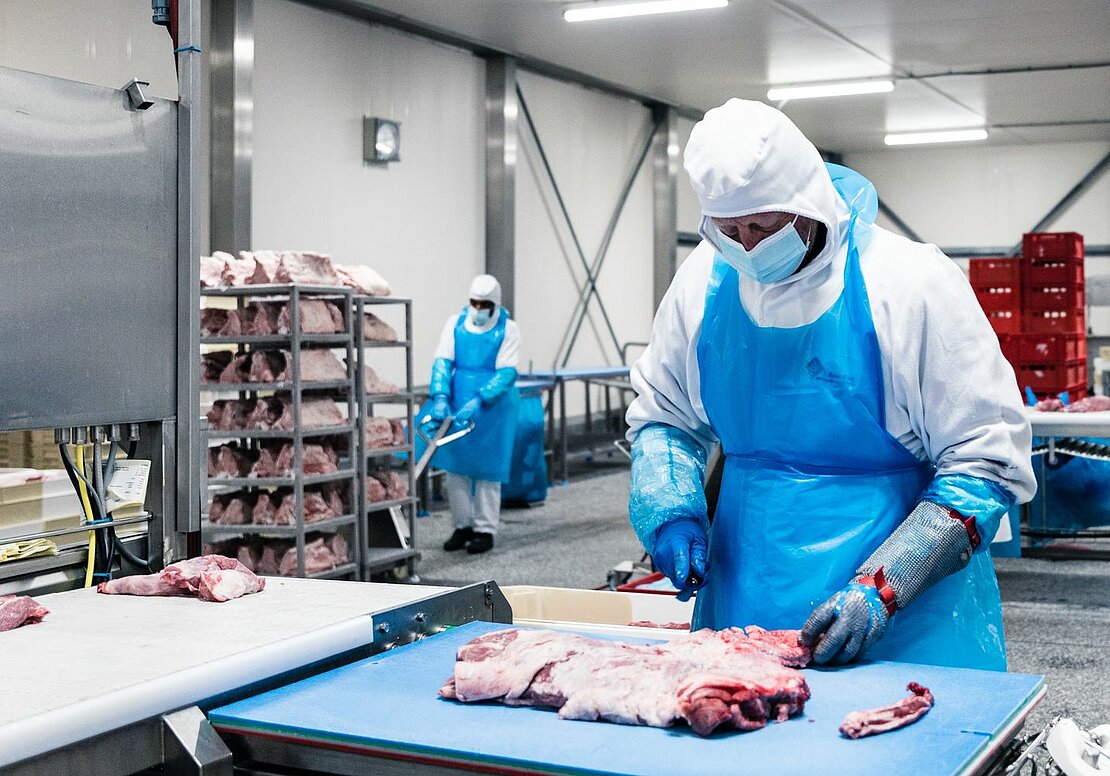The VanDrie Group aims to make optimal use of every meat component, raw material, waste flow or by-product. Thinking in terms of cycles and the use of waste flows have been an integral part of the company’s policy from day one. This means that we actively invest in setting up the food supply chain in a smarter way. Therefore, at T. Boer & Zn. a large part of the slaughter line is currently being upgraded. It is a two-year project in which the cooling processes will also be critically evaluated. Mellema says: “An optimal cooling process enables us to extend the shelf life of our meat by several days. In this regard, the company has been able to make great progress by completely renewing the large precooler.” He continues: “Now, we have largely switched from a synthetic cooling agent to a natural one. This allows us to control the recooling faster and better, and the shelf life of the meat increases. This has a big, positive impact. In particular, because some of our products are exported. An increased shelf life allows you to manage logistics in a smarter way and spread deliveries better. This saves fuel and transport movements. You minimize waste on that front too.” These are not the only advantages of the new cooling process. The precooler saves energy and, in terms of cooling processes makes T. Boer & Zn. virtually a net zero emissions company. In addition, the heat generated isn’t wasted. Mellema says: “We use that residual heat, for example, to heat the sterilisation water and for our offices.”
Smarter packaging solutions
Besides shelf life, the VanDrie Group invests in optimal packaging to keep waste flows to a minimum. The company has recently invested in new vacuum sealer machines. “This allows us to vacuum seal in a faster, more efficient and more cost-effective way,” Mellema explains. “This results in is less residual plastic, thus reducing plastic use by almost 10% a year.” Furthermore, T. Boer & Zn. has done extensive research into separating packaging waste flows more effectively for the purpose of reuse. Considerable progress has been made on that front as well. The waste has been reduced further by 12%. And that’s not all:T. Boer & Zn. has also invested in software to monitor the usage of non-food products such as packaging and cleaning products more effectively. Mellema says: “If that usage increases anywhere in our processes, we can see it."
But we continue to invest in cutting down on food loss, waste streams and logisitics flows even further.
Martijn Mellema
Transport is another area with respect to which the VanDrie Group is fully committed to reducing waste. In the case of T. Boer & Zn. – which has two locations about three kilometres apart – the processes for the required export documents for shipments have been separated. This has reduced the number of transport movements between the two locations by 80%. The company also makes more and more use of groupage. “This means that trucks are sent to a distribution centre before going to a European customer. The advantage of such a hub is that the mileage in Europe is much lower. Every kilometre covered is more efficient.” Moreover, the latter is already the case because the T. Boer & Zn. fleet has completely been renewed with cleaner diesel engines that meet the latest emission standards.
T. Boer & Zn. distinguishes themselves – and it might not even be the only one when it comes to waste – by also taking good care of its personnel. “We offer good employment conditions, opportinuties for growth, and good employment practices. We also want to create long-term loyalty among our flex workers.”
